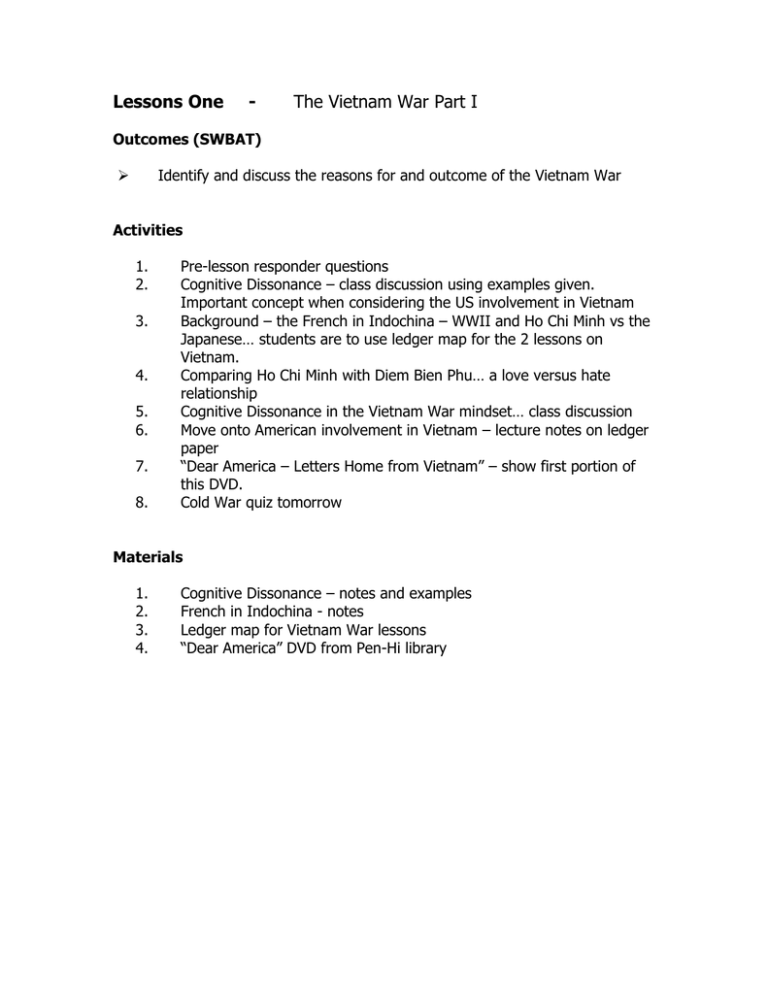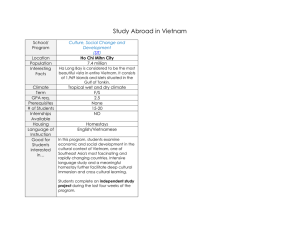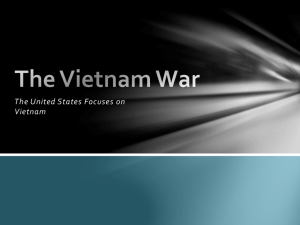Lessons The Vietnam War Part I
advertisement

Lessons One - The Vietnam War Part I Outcomes (SWBAT) Identify and discuss the reasons for and outcome of the Vietnam War Activities 1. 2. 3. 4. 5. 6. 7. 8. Pre-lesson responder questions Cognitive Dissonance – class discussion using examples given. Important concept when considering the US involvement in Vietnam Background – the French in Indochina – WWII and Ho Chi Minh vs the Japanese… students are to use ledger map for the 2 lessons on Vietnam. Comparing Ho Chi Minh with Diem Bien Phu… a love versus hate relationship Cognitive Dissonance in the Vietnam War mindset… class discussion Move onto American involvement in Vietnam – lecture notes on ledger paper “Dear America – Letters Home from Vietnam” – show first portion of this DVD. Cold War quiz tomorrow Materials 1. 2. 3. 4. Cognitive Dissonance – notes and examples French in Indochina - notes Ledger map for Vietnam War lessons “Dear America” DVD from Pen-Hi library History 12 Ms. Lacroix name ____________________________________ Vietnam Part I – pre-lesson questions Key Concepts: Key Players: containment ‘Titoist’ communism nationalism Cold war domino theory Vietnamization Guerilla warfare Nixon Doctrine South Vietnam North Vietnam Diem Bien Phu Ho Chi Minh ARVN North Vietnamese Army United States Viet Cong NLF (Eisenhower, Kennedy, Johnson, Nixon) Preamble: WWII demonstrated to the USA that isolationism based on a false sense of security failed. Containment and intervention were the new policies. Does this compromise the historical notion of national self-determination? Is national security compromised by revolutionary independence movements? South Vietnam under Diem 1954-63 Nepotism and graft Key Notes First Indochina War (Vietnam) Vietnam Conflict 1946-54 1961-75 FRANCE AMERICA (military action from 1965-72) Today there is one country called the Republic of Vietnam Americans not defeated in the field but withdraw after 1973 truce Are economically weak today Vietnam in 1945 The French, Japanese, Viet Minh and Emperor Bao Dai all claim rule over Vietnam After fall of France in 1940, French Indochina under Japanese control VIET MINH opposed to French and Japanese imperialism, waged guerilla warfare until Japanese are ousted in 1945 HO CHI MINH set up government in Hanoi, called Democratic People’s Republic of Vietnam, but France returns to Indochina and gains control of the South – North Vietnam refuses to be controlled by France and latter would not grant independence – hence the conflict Viet Minh – nationalist or communist? THE FIRST INDOCHINA WAR – 1946-54 Reasons for? (H 201) Why victory for the Viet Minh? (include Dien Bien Phu. (D 215) Geneva Agreements (Accord) of 1954 Provide specific details plus hist. sig. (D 215) (H 214) (mapbook 128) Eisenhower’s “domino theory” (D 215) ANZUS Pact (1951) (H 215) SEATO 1954 (H 215) Purpose Members Weaknesses Historical significance Reasons for French loss in Indochina (in class) Map Book page 128-29 – make sure you are familiar with this geographic area… CHINA CAMBODIA THAILAND LAOS VIETNAM (N and S) Cognitive Dissonance is a discomfort caused by holding conflicting ideas simultaneously. The theory of cognitive dissonance proposes that people have a motivational drive to reduce dissonance. They do this by changing their attitudes, beliefs, and actions. Dissonance is also reduced by justifying, blaming, and denying. The phrase was coined by Leon Festinger in his 1956 book When Prophecy Fails, which chronicled the followers of a UFO cult as reality clashed with their fervent beliefs. Examples: The Fox and the Grapes In the story, a fox sees some high-hanging grapes and wishes to eat them. When the fox is unable to think of a way to reach them, he surmises that the grapes are probably not worth eating, as they must not be ripe or that they are sour. This example follows a pattern: one desires something, finds it unattainable, and reduces one's dissonance by criticizing Self-Evaluation You, as a child, love a certain sport. You have posters on your bedroom wall, all the magazines relating to said sport, idolize its international stars. As you enter middle school, you start to see that on said sports team, you aren’t very good at that sport, spend lots of time on the bench and eventually don’t make the high school team. To reduce the dissonance you are experiencing, you blame your coaches, take down all your posters in your room, and state that the game is really quite “dumb”. Buyer’s Remorse You bought a Blackberry in the summer of 2011. For 3 days in October, you couldn’t’ get any service, texts, nothing. You now have 2 options: 1. discount the new evidence as meaningless… you didn’t really get affected negatively by the lack of service even though all your iPhone friends were texting, on-line, phoning each other 2. truly regret and renounce the purchase, claiming that your Blackberry is a piece of garbage and you should never have spent so much money on it. *we will work this important concept into America’s rationalization of the Vietnam War Lecture Notes to include on ledger for Lesson 1 Concepts French Imperialism vs Vietnamese national self-determination Role of ANZUS and SEATO -both treaty organizations set up to contain communism USA under Truman, then Eisenhower, heavily funded and armed the French Why did the French lose? France was increasingly unable to afford the costly conflict in Indochina and, by 1954, the United States was paying 80% of France's war effort which was $3,000,000 per day in 1952 A strong anti-war movement came into existence in France driven mostly by the then powerful French Communist Party Popularity of Ho Chi Minh (Father Ho) and General Giap (“Yap”) FRENCH OUT… Geneva Convention, 1954 Independent Laos and Cambodia Vietnam divided at 17th parallel… south to hold elections shortly Unpopularity of Ngo Dinh Diem – corrupt tyrant… Catholic He never held the promised elections… practiced nepotism and graft Growing guerilla movement National Liberation Front – supported by: Communists Buddhists Vietnamese that resented both French and American involvement Peasants – sheltered and fed the NLF Question for class discussion… To what extent would cognitive dissonance apply to America’s decision to get involved in Vietnam in 1963?




